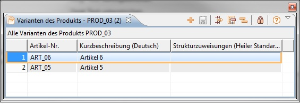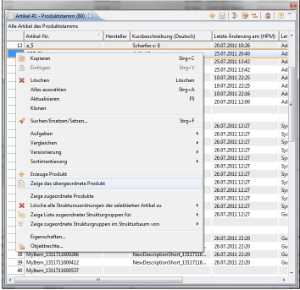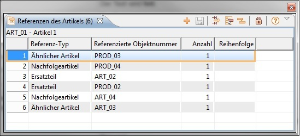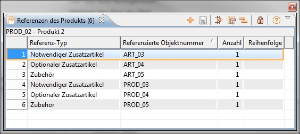References between products and items
References between products and items can represent typical relations in the sense of merchandising associations or being the relationship where the items are the variations of a certain product. Find more general details on these topics here: Merchandising associations between products and items and Product Paradigm - an understanding of products and their items.
With version 6.0 of the Heiler Product Manager the product paradigm introduced with version 5.2 initially was enhanced and improved by separating the data entities of products and items from each other. This topic describes how the product items relation ship now works with this version.
The items of a product
As described in the topic about the Product Paradigm this is a very special type of reference between products and items. In this relationship items belong uniquely to one product representing its different variations.
Front-end / data maintenance
At the front-end a table view is provided showing the items belonging to a single product are listed. This table view works based on the selection of a single product, e. g. provided from a products' table view. This view is called "Items of the product" (de: "Artikel des Produkts") formerly (versions 5.2/5.3) known as "Referenced items of the product" (de: "Referenzierte Artikel des Produkts") and in Version 6 known as "Variants of the product" (de: "Varianten des Produkts").


Export
From an Export point of view the items data providers do have access to the product they belong to (if they do). Through a transition they can access all qualified data fields of their parent product (this is new with 6.0, not been available in versions 5.2and 5.3).
Even it is exactly one product an item belongs to this is realized by a sub-data type like it is done usually for typical 1:n-relationships. This is necessary due to technical circumstances.
On the other hand the product data providers offer a sub-data type to iterate over the items related to the certain product as its variations. Also here a transition to the item allows to access all qualified data fields of the items.
Overview on the sub-data types in the relevant export data providers of version 6.0:
|
main entity |
sub-datatype |
exported entity |
remarks |
datatype filters |
|
Article |
Superordinate Product (de: Übergeordnetes Produkt) |
ProductReference |
new, transitions to products available |
no datatype filter |
|
Product |
Items of the Product (de: Artikel des Produkts) |
Article |
exports all items which are product variations |
no datatype filter |
Merchandising associations
Any kind of merchandising association can be established and may exist between all types of objects (products and items) in any direction.
Front-end / data maintenance
At the front-end these references are displayed in detail table views formerly known as "Item References". Now two of these views are available one for the entity Product, one for the entity Items working together with a selection of an object of the corresponding type each.
Both views show the already known reference information (the reference type and the identifier of the referenced object, the number of referenced objects and a sort order numbering). Due this information is independent of the concrete referenced object type (product or item) both types can be displayed together.
To differentiate these two views uniquely when using them together the names are adapted now to "References of the item" (de: "Referenzen des Artikels") and "References of the product" (de: "Referenzen des Produkts").


Export
For exporting both items and products the corresponding data providers offer several sub-data types to export the referenced items and products related to the object the export is currently working on. Here two different types of sub-data types are available.
One provides the list of all referenced objects (products and items) with the basic information of the referenced objects like it is in the detail views described above (the reference type and the identifier of the referenced object, the number of referenced objects and a sort order numbering, ...).
A second type of sub-data type offers the access to all information of the referenced object by a so called transition. Here the sub-data types work object dependent; that means referenced items and referenced products are processed separately (because they are individual data entities which might have individual data fields).
Overview on the sub-data types in the relevant export data providers of version 6.0:
|
main entity |
sub-datatype |
exported entity |
remarks |
datatype filters |
|
Article |
References of the Item (de: Referenzen des Artikels) |
ArticleReference |
new, corresponds to data in "Referenzen des Artikels" view, no transitions, only fields of the reference itself (reference type, referenced object number, quantity) |
reference type |
|
Article |
Referenced Items (de: Referenzierte Artikel) |
ArticleReference |
as before, transitions to articles available |
reference type, |
|
Article |
Referenced Items (filtered) (de: Referenzierte Artikel (gefiltert)) |
ArticleReference |
as before, transitions to articles available |
reference type |
|
Article |
Referenced Products (de: Referenzierte Produkte) |
Article2Product2GReference |
new, transitions to products available |
reference type, |
|
Product |
References of the Product (de: Referenzen des Produktes) |
Product2GReference |
new, corresponds to data in "Referenzen des Produkt" view, no transitions, only fields of the reference itself (reference type, referenced object number, quantity) |
reference type |
|
Product |
Referenced Items (de: Referenzierte Artikel) |
Product2G2ArticleReference |
transitions to articles available |
reference type, |
|
Product |
Referenced Products (de: Referenzierte Produkte) |
Product2GReference |
transitions to products available |
reference type, |
|
Product |
Referenced Products (filtered) (de: Referenzierte Produkte (gefiltert)) |
Product2GReference |
transitions to products available |
reference type |
Further Information
For further information read:
Product Paradigm - an understanding of products and their items
Find tech. details on references of version 6.0 in the New and Noteworthy